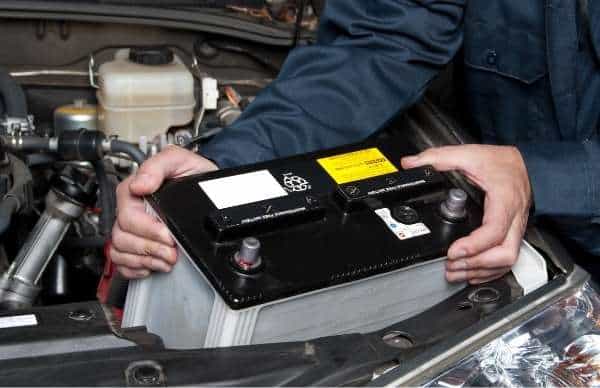
According to the US Energy Information Administration (EIA), solar power production will be the fastest growing renewable energy source by 2050.
Considering the benefits on offer, Solar power’s growing popularity is justified. Although there is no doubt that solar power has disrupted energy production, we believe that the advent of affordable solar batteries can really transform how we power our homes.
You may want to shift your solar power off-grid or you’re just curious about batteries and want to know the difference between solar batteries and normal batteries. Let’s discuss the differences and take a look at the pros and cons of each.
What are the Differences Between a Solar and Normal Battery?
The main difference between a solar battery and a normal battery is that solar batteries are designed for multiple recharges and are connected directly to solar panels. Normal batteries, such as alkaline or lithium batteries, are designed for high discharge rates and deliver a burst of energy quickly.
Solar batteries, as the name suggests, are specifically designed to store energy generated from solar panels.
These batteries typically have higher capacity and are optimized to withstand deep discharges and frequent charging cycles, which are common in solar applications.
According to Renogy, batteries used for solar power systems should be deep cycle batteries, including lithium-ion, lead-acid, and saltwater batteries.
On the other hand, normal batteries, also known as traditional batteries, are designed for general-purpose energy storage needs. They are commonly used in various devices such as flashlights, remote controls, and electronic gadgets.
Normal batteries are not specifically optimized for solar applications and may not have the capacity or durability required for storing energy generated from solar panels.
One key difference between solar batteries and normal batteries is their chemical composition. Solar batteries often use advanced technologies like lithium-ion or lead-acid, which provide higher energy density and longer lifespan compared to the traditional alkaline batteries commonly found in the market. This allows solar batteries to handle the unique demands of solar energy storage efficiently.
Solar batteries often come with built-in features such as smart management systems that optimize the charging and discharging processes, ensuring maximum efficiency and longevity.
These systems can monitor the energy flow, regulate the charging process, and protect the battery from overcharging or discharging, thus enhancing the overall performance and lifespan of the battery.
Table of Contents
Can Normal Batteries be used Instead of Solar Batteries?
While normal batteries may seem like a cost-effective alternative, they are not specifically designed for solar applications and may not provide optimal performance or longevity in this context.
Normal batteries, also known as traditional batteries, are commonly used in various devices such as remote controls, flashlights, and electronic gadgets. They are not optimized for solar energy storage and lack the capacity, durability, and specialized features required for storing energy generated from solar panels.
Solar batteries are designed to store excess energy produced by solar panels during the day for use during the night or when the sun is not shining. These batteries typically have higher capacity and are optimized to withstand deep discharges and frequent charging cycles, which are common in solar applications.
By using normal batteries instead of solar batteries, you may face several limitations. Normal batteries may not have the capacity to store enough energy for extended periods or handle the demands of solar energy storage efficiently. They may also lack the built-in features, such as smart management systems, that optimize charging and discharging processes and protect against overcharging or discharging.

Can Car Batteries be used in Place of Solar Batteries?
Car batteries are not typically recommended or suitable for use as a direct replacement for solar batteries in solar energy systems because they are not designed for deep cycling or prolonged energy storage.
Car batteries are primarily designed to provide high bursts of energy to start the engine and power the vehicle’s electrical systems.
Solar batteries, on the other hand, are specifically engineered to store energy generated by solar panels over extended periods. They are designed to handle deep discharges and frequent charging cycles, which are common in solar applications. Solar batteries have higher capacity and are built to provide sustained power over an extended period.
Car batteries typically use a type of lead-acid chemistry, which is different from the advanced chemistries used in solar batteries such as lithium-ion or other deep-cycle battery technologies.
The construction and chemistry of solar batteries allow them to withstand the unique demands of solar energy storage, providing better efficiency, durability, and longer lifespan.
Solar batteries often come with built-in features like smart management systems that optimize the charging and discharging process, as well as protection against overcharging or discharging. These features are specifically designed for solar applications and may not be present in car batteries.
While it may be possible to use a car battery temporarily in a solar energy system as a temporary backup or for very small-scale applications, it is generally not recommended or practical in the long run.
To ensure optimal performance, efficiency, and longevity of a solar energy system, it is advisable to use batteries specifically designed and optimized for solar applications.
- Purpose: Car batteries are designed for short bursts of high energy to start engines and power vehicle systems, while solar batteries are optimized for long-term energy storage in solar applications.
- Capacity: Solar batteries typically have higher capacity and are designed to handle deep discharges and frequent charging cycles, which are common in solar energy systems. Car batteries may not have the necessary capacity for sustained energy storage.
- Chemistry: Car batteries often use lead-acid chemistry, whereas solar batteries employ advanced chemistries like lithium-ion or deep-cycle technologies. The different chemistry of solar batteries provides better efficiency, durability, and longer lifespan.
- Construction: Solar batteries are constructed to withstand the unique demands of solar energy storage, with features such as reinforced casings and internal designs that allow for efficient energy storage. Car batteries lack these specific design elements.
- Optimization: Solar batteries often come with built-in features like smart management systems that optimize the charging and discharging process, protect against overcharging or discharging, and maximize efficiency. Car batteries do not typically include these specific optimizations for solar applications.
- Longevity: Solar batteries are designed to endure deep cycling and frequent charging cycles over an extended period. Car batteries, designed for automotive use, may not have the longevity required for long-term solar energy storage.
- Compatibility: Solar energy systems have specific voltage and capacity requirements, and using a car battery as a substitute may not meet these specifications, potentially leading to suboptimal system performance or damage.
- Warranty: Using a car battery in a solar energy system may void any warranty or guarantees associated with the solar system components, as they are not designed or approved for such use.

Is a Solar Battery Right for You?
Determining if a solar battery is right for you involves considering several factors related to your specific energy needs and goals. Here are some key considerations to help you make an informed decision:
- Energy Usage: Assess your energy usage patterns and determine if you frequently experience power outages or need backup power. If you require uninterrupted power supply or want to maximize self-consumption of solar energy, a solar battery can be beneficial.
- Solar System Size: Evaluate the size of your solar energy system. If you have a larger system that generates excess energy, a solar battery can store and utilize that surplus energy instead of exporting it to the grid.
- Cost Savings: Calculate the potential cost savings of installing a solar battery. Consider factors such as peak demand charges, time-of-use rates, and net metering policies in your area. A solar battery can help you reduce your reliance on grid energy and optimize your energy consumption to minimize expenses.
- Energy Independence: Determine your desire for energy independence. If you aim to reduce dependence on the grid and have a reliable power source during outages, a solar battery can provide energy autonomy and peace of mind.
- Battery Capacity: Evaluate your energy storage requirements. Determine the amount of energy you need to store for your specific needs, such as overnight usage or during extended periods of low solar generation. Choose a solar battery with adequate capacity to meet your storage needs.
- Battery Lifespan: Consider the lifespan of the solar battery. Evaluate the warranty period, depth of discharge capabilities, and the expected number of charging cycles the battery can withstand. A longer lifespan and higher cycle life can ensure a better return on investment.
- Integration and Compatibility: Ensure that the solar battery is compatible with your existing solar energy system. Consider factors such as voltage compatibility, inverter requirements, and any necessary system upgrades or modifications.
- Maintenance and Monitoring: Assess the maintenance requirements of the solar battery. Determine if it requires regular maintenance or monitoring and if you are willing to fulfill those requirements.
- Environmental Impact: Evaluate the environmental impact of the solar battery. Consider the battery’s chemistry, recyclability, and sustainability factors. Opt for batteries with greener and more eco-friendly characteristics.
- Financial Feasibility: Analyze the upfront costs, available financing options, potential incentives, and long-term savings to determine the financial feasibility of installing a solar battery in your energy system.
What Are the Disadvantages of Using Solar Batteries?
While solar batteries offer numerous benefits for energy storage in solar power systems, it’s important to be aware of their potential disadvantages as well. Here are a few considerations:
- Cost: Solar batteries can be more expensive upfront compared to regular batteries. The advanced technologies and specialized design of solar batteries contribute to their higher cost. However, it’s important to weigh this against the potential long-term savings and benefits they provide.
- Limited Capacity: Solar batteries have a limited capacity for energy storage. The capacity of a solar battery determines how much energy it can store and discharge. If your energy consumption exceeds the capacity of the battery, you may experience a power shortage during periods of low sunlight or at night.
- Lifespan and Degradation: Like all batteries, solar batteries have a limited lifespan. Over time, the performance and capacity of the battery may degrade, requiring eventual replacement. The lifespan can be affected by factors such as the depth of discharge, temperature, and maintenance practices.
- Efficiency: While solar batteries are designed for efficient energy storage, they are not 100% efficient in storing and releasing energy. Some energy loss occurs during the charging and discharging processes, reducing overall efficiency. It’s important to consider the efficiency ratings of different solar battery models.
- Environmental Impact: Solar batteries, particularly those with certain chemistries, may have environmental implications. Disposal or recycling of batteries, especially those containing hazardous materials, must be done properly to minimize their environmental impact. Opting for batteries with more eco-friendly chemistries can help mitigate this concern.
- Maintenance: Solar batteries may require periodic maintenance to ensure optimal performance and longevity. This can involve monitoring the battery’s state of charge, checking connections, and ensuring proper ventilation. Maintenance requirements may vary depending on the battery chemistry and manufacturer recommendations.
- Compatibility: Solar batteries need to be compatible with the specific requirements of your solar power system. This includes voltage compatibility, proper integration with the inverter, and any necessary system modifications. Ensuring compatibility is essential to maximize the efficiency and performance of your solar power system.
While these disadvantages exist, the overall benefits of solar batteries often outweigh them. It’s crucial to carefully evaluate your energy storage needs, consider the specific disadvantages, and choose a solar battery that aligns with your requirements and goals. Consulting with solar energy professionals can help you make an informed decision based on your unique circumstances.
Frequently Asked Questions
What are the Advantages of Using a Solar Battery Over a Normal Battery?
Unlike normal batteries, solar batteries have higher capacity, are optimized for deep discharges and frequent charging cycles, and often come with built-in features like smart management systems for optimized performance and longevity.
Solar batteries are specifically designed to handle the unique demands of solar energy storage, providing better efficiency and durability.
Are Solar Batteries More Expensive than Normal Batteries?
In general, solar batteries tend to be more expensive than normal batteries. This is because solar batteries are designed to meet the specific requirements of solar energy storage and often utilize advanced technologies like lithium-ion or lead-acid chemistry.
These advanced technologies contribute to higher costs but also provide higher capacity, longevity, and efficiency, making them a worthwhile investment for solar energy systems.
Can I Use a Solar Battery for Other Applications Besides Solar Energy Storage?
While solar batteries are specifically designed for solar energy storage, they can be used for other applications as well. However, it’s important to ensure compatibility with the specific requirements of the application.
For example, the voltage and capacity of the solar battery should match the requirements of the application to ensure optimal performance.
How Long Do Solar Batteries Typically Last?
Generally, solar batteries can last anywhere from 5 to 15 years or more, depending on the specific battery technology and usage patterns. It’s important to consider the warranty and lifespan when selecting a solar battery for your energy storage needs.
Can I Use a Normal Battery with A Solar Panel?
While it is possible to connect a normal battery to a solar panel, it may not provide efficient or optimal energy storage.
Normal batteries are not specifically designed for solar applications and may not handle the unique demands of solar energy storage effectively. It’s recommended to use a battery specifically designed for solar applications to ensure better performance and longevity.
Can Solar Batteries Be Recharged in A Charger?
Any rechargeable battery, including solar batteries, can be charged with the right type of charger. In fact, an external charger can be used to recharge solar batteries without the use of solar modules or sunlight.
Do You Need Special Batteries for Solar Power?
Typically, special batteries are recommended for solar power systems. Solar power systems generate DC (direct current) electricity, which needs to be stored for use during periods of low sunlight or at night.
Special solar batteries are designed to efficiently store and discharge this energy, ensuring optimal performance and longevity.
